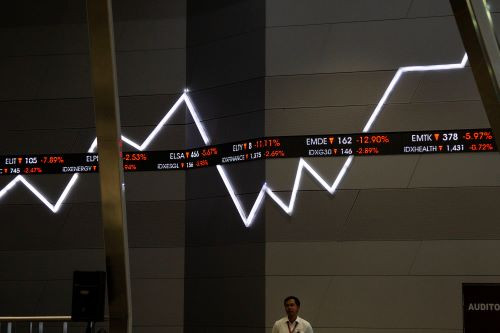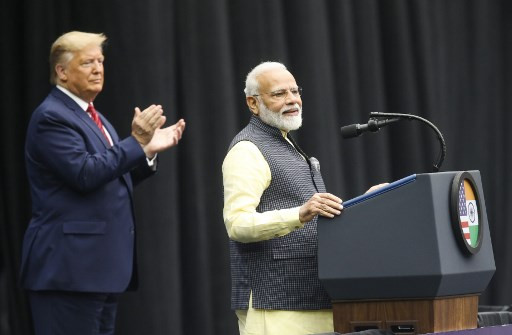Popular Reads
Top Results
Can't find what you're looking for?
View all search resultsPopular Reads
Top Results
Can't find what you're looking for?
View all search resultsIDX Composite down 0.74%, falls below 7,200 threshold
The IDX Composite index fell by 0.74 percent to 7,161.25 on Friday, weighed down by global Fed rate concerns and domestic value added tax (VAT) hike fears.
Change text size
Gift Premium Articles
to Anyone
 An employee walks past a giant monitor showing the fluctuations of the Composite index at the Indonesia Stock Exchange (IDX) in Jakarta on Aug. 5, 2024. The IDX Composite index fell by 0.74 percent to 7,161.25 on Nov. 15, 2024, weighed down by global Fed rate concerns and domestic value added tax (VAT) hike fears. (Antara/Dhemas Reviyanto)
An employee walks past a giant monitor showing the fluctuations of the Composite index at the Indonesia Stock Exchange (IDX) in Jakarta on Aug. 5, 2024. The IDX Composite index fell by 0.74 percent to 7,161.25 on Nov. 15, 2024, weighed down by global Fed rate concerns and domestic value added tax (VAT) hike fears. (Antara/Dhemas Reviyanto)
T
he Indonesia Stock Exchange (IDX) Composite index fell below the psychological threshold of 7,200 by the end of the Friday, losing 0.74 percent to close at 7,161.25.
Most sectors ended in the red. The basic materials and non-cyclical consumer sectors weighed down the index the most, falling by 1.92 percent and 1.38 percent, respectively.
The industrial sector stood out as the sole gainer, rising 0.49 percent.
The day's transaction value reached approximately Rp 11 trillion (US$708 million), with 48 billion shares changing hands in 1.2 million transactions. A total of 198 stocks gained, 393 declined and 196 remained unchanged.
The top gainers on the LQ45 index today were PT Unilever Indonesia (UNVR), which rose by 4.24 percent, PT Adaro Energy Indonesia (ADRO), which gained 2.35 percent, and PT United Tractors (UNTR), which increased by 2.21 percent.
Meanwhile, the top losers on the LQ45 index were PT Aneka Tambang (ANTM), which fell by 5.41 percent, PT Bukalapak.com (BUKA), which lost 4.03 percent, and PT AKR Corporindo (AKRA), which shed 3.70 percent.
Globally, the market was rattled by the United States Federal Reserve’s signals to cut its benchmark rate at a slower pace. Fed chairman Jerome Powell emphasized that robust US economic growth did not warrant a hasty rate reduction, citing stronger-than-expected Q3 gross domestic product growth.
“While inflation is nearing our long-term target of 2 percent, it remains slightly elevated,” Powell said in his speech to business leaders in Dallas, Texas, on Thursday. “We are committed to completing this task.”
US inflation increased to 2.6 percent in October, from 2.4 percent in September, with unemployment reaching 4.1 percent.
On the domestic front, concerns over the planned value-added tax (VAT) hike to 12 percent starting in January 2025 further weighed on investor sentiment.
Finance Minister Sri Mulyani Indrawati emphasized that the increase, outlined in the Tax Regulation Harmonization Law, is necessary to maintain fiscal health.
Critics argue that higher VAT will weaken consumer purchasing power, which accounts for 53 to 56 percent of Indonesia’s economy, potentially impacting manufacturing, retail sales, and consumer confidence.









